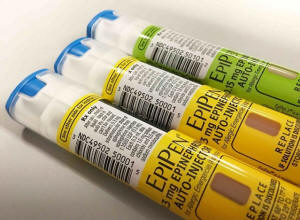|
U.S. government health plans spent over
$1 billion on EpiPens over five years
 Send a link to a friend
Send a link to a friend
 [October 06, 2016]
By Bill Berkrot [October 06, 2016]
By Bill Berkrot
(Reuters) - U.S. government health plans
spent more than $1 billion on Mylan NV's EpiPen emergency allergic
reaction treatment between 2011 and 2015, according to figures released
by the Centers for Medicare and Medicaid Services on Wednesday.
Mylan is under scrutiny for raising prices on the lifesaving EpiPen
sixfold in less than a decade, making the devices unaffordable for a
growing number of families. U.S. lawmakers and prosecutors are also
investigating what impact Mylan's EpiPen pricing has had on
government-funded health programs.
CMS, in response to a request from U.S. Senator Amy Klobuchar of
Minnesota, said in a letter that the Medicaid plan for the poor spent
$797 million on EpiPen in the five-year period, including rebates
provided by Mylan, or $960 million before rebates. Costs for the
Medicare Part D program for the elderly was nearly $335 million, a
figure that does not reflect rebates.
Klobuchar and other lawmakers contend that Mylan underpaid rebates to
state Medicaid programs by misclassifying EpiPen as a generic instead of
a branded drug. The Medicaid rebate for a generic is 13 percent compared
with a minimum 23.1 percent for a branded drug.

CMS said it could not determine how much the government is owed for
EpiPens, but reiterated its view that Mylan had misclassified the
product.
"CMS has, on multiple occasions, provided guidance to the industry and
Mylan on the proper classification of drugs and has expressly told Mylan
that the product is incorrectly classified," the agency said.
Mylan has said it complied with CMS rules. On Wednesday, it noted that
the classification of EpiPen for Medicaid rebates had been made in 1997,
a decade before it acquired the product.
New CMS rules that took effect this year allow companies to clarify any
classification issues for a product like EpiPen, with companies asked to
submit their requests by April 1, 2017.
[to top of second column] |

EpiPen auto-injection epinephrine pens manufactured by Mylan NV
pharmaceutical company for use by severe allergy sufferers are seen
in Washington, U.S. August 24, 2016. REUTERS/Jim Bourg/File Photo

"It would be premature to comment further on this issue until the
CMS process has concluded," Mylan said.
Klobuchar in a statement called for "clear answers on how deep this
misclassification goes, how much it has cost taxpayers across the
country, how many other drugs may be misclassified, and how we get
that money back."Mylan Chief Executive Heather Bresch was blasted by
lawmakers during a congressional hearing last month for raising the
list price for a pair of EpiPens to more than $600 this year. It
cost about $100 in 2007, when Mylan acquired the product.
Mylan has said the list price does not reflect its true earnings on
EpiPen once its discounts to payers, development costs and other
expenses are taken into account.
It has sought to address the criticism by offering discounts more
widely to consumers and plans to make available a generic version
for about $300.
(Reporting by Bill Berkrot; Editing by Michele Gershberg and Richard
Chang)
[© 2016 Thomson Reuters. All rights
reserved.]
Copyright 2016 Reuters. All rights reserved. This material may not be published,
broadcast, rewritten or redistributed.
 |